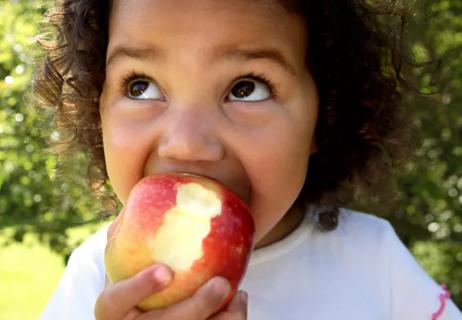Study confirms social media can sway kids to eat junk food

Every parent expects, at some point, their child will ask for a food item they saw advertised online or on TV. Now, a recent study reveals how much impact social media has on a child’s food choices.
Advertisement
Cleveland Clinic is a non-profit academic medical center. Advertising on our site helps support our mission. We do not endorse non-Cleveland Clinic products or services. Policy
Researchers looked at 176 children between the ages of 9 and 11.
Children were randomly assigned to view different profiles of social media “influencers” with healthy snacks, unhealthy snacks or non-food products.
The study found that the kids who viewed the social media posts with unhealthy snacks ate more calories and had significantly increased intake of unhealthy foods than the children who viewed the healthy snacks or the non-food items.
However, the children who viewed the healthy snacks weren’t compelled to eat more healthy foods.
Child psychologist Kate Eshleman, PsyD, did not take part in the study, but says it probably comes as no surprise that advertisements are very persuasive to children.
“The advertisements have a lot of impact on the kids,” she says. “They see it and they want it, and parents have to be prepared to limit those things in the home.” Dr. Eshleman says avoiding the pitfalls of social media marketing comes down to communicating with children about healthy choices. This includes which food items should be in the home and which ones should not.
Dr. Eshleman says parents should always know what their children are watching so they can talk about the content they’re viewing.
Advertisement
“In general, it’s important for parents to know what their kids are watching – and that includes the ads,” she says. “You want to know why a child is asking about this, or why they’re talking about that. And the best way to understand those things is to be aware of what they’re watching.”
Dr. Eshleman notes the study results don’t mean parents shouldn’t allow their children to view content online. But she recommends making sure they’re watching it in plain view – on a computer that you can see, or on a television – but not on a hand-held device.
Advertisement
Learn more about our editorial process.
Advertisement

Most kids get enough protein in a regular diet — too much can have side effects

Look for snacks that are low in sugar and high in fiber, protein and healthy fats

Turn down the pressure, but don't stop offering

Kids typically get all the nutrients they need from food, but supplements can add peace of mind

The five major food groups offer different types of nutrients in the right proportions

Be a good role model, set family meal times and involve your kids in meal planning

How to keep kids' diets healthy while the sun heats things up

Fiber can lower blood pressure and promote healthy bowel function

Wearing a scarf, adjusting your outdoor activities and following your asthma treatment plan can help limit breathing problems

Your diet in the weeks, days and hours ahead of your race can power you to the finish line

When someone guilt trips you, they’re using emotionally manipulative behavior to try to get you to act a certain way